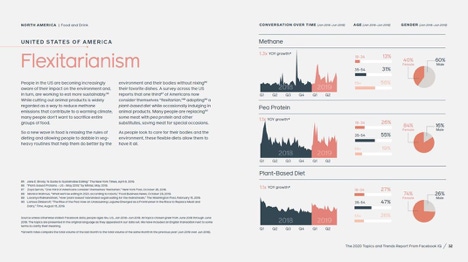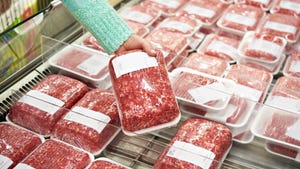Cattle & Climate Part 1: Facebook IQ suggests a Flexitarian diet
A Facebook IQ trending report suggests flexitarianism is the best way to promote a healthy planet and a healthy population.
December 20, 2019

One of the most frequent questions I get asked from BEEF Daily readers is how I come up with topics to write every Monday through Thursday. I tend to draw inspiration from what’s going on at the ranch and at home. I also get ideas from agricultural conferences I’m speaking at. However, most of my blog ideas come from chatter on social media.
What are politicians up to that might impact producers? What new societal demands are retailers looking at that might change the menu or influence beef demand? What are consumer perceptions about beef, and how can we best respond to the misinformation?
And quite often, BEEF readers themselves help me identify topics to address. Recently, Kym Cooper Parks, a livestock producer from Ohio, reached out to me about a Facebook IQ trending report that reinforces the typical "cattle are destroying the planet” mantra.
Cooper Parks writes, “As you know, I manage a few social media pages (35 to be exact), so I am always reading the latest trends and what is coming down the pike. Today I open my report from Facebook IQ for North American trends, and this slide was part of the discussion.
“Titled, ‘Flexible Vegetarianism,’ the infographic talks about livestock being part of the climate change conversation, and it never mentions that this isn't scientifically true. Instead, they actually propagated the myth to 100,000+ marketing professionals across the globe.
“Facebook IQ, I have never been so disappointed in one of your trending reports. Please, if you are going to talk about a trend on social media, please be more accurate and use real scientific research instead of the generalization you used in this report.
“Livestock producers depend on people understanding our care standards, environmental practices and the value that we bring to economies across the globe. The fact that you are just willing to share this statement because it is a trend isn't fair us or the people who now have that implanted in their minds from another ‘reliable’ source of information.
“If you have any questions or need an expert to provide science-based facts, let me introduce you to Amanda Radke or Trent Loos, who frequently share their knowledge on the platform that you promote.”
Her frustrations stem from the Facebook IQ report stating that reducing beef production is “widely regarded as a way to reduce methane” and that plant-based, flexitarian diets that reduce meat intake to just occasional indulgences allow folks to “take care of their bodies and the environment.”
While the cattle and climate link has been debunked on this blog many times over now, it appears we still have plenty of work cut out for us. I’ve tried to address these misconceptions in a variety of ways to further connect with consumers and bridge the widening gap we have between rural and urban America.
Read my previous attempts to bridge the gap on these past blog posts:
Yet despite these efforts, not to mention the countless other voices advocating for animal agriculture on this subject, these myths seem to be so ingrained into our society that these falsehoods are going to be very hard to correct.
Perhaps understanding what the consumer is really thinking might help us shape our conversations on this topic in 2020 and beyond.
Stay tuned for part two of this series releasing the day after Christmas, where I’ll share new research that indicates what U.S. consumers truly think about “farting cows” and going meatless to save the planet.
The opinions of Amanda Radke are not necessarily those of beefmagazine.com or Farm Progress.
About the Author(s)
You May Also Like





